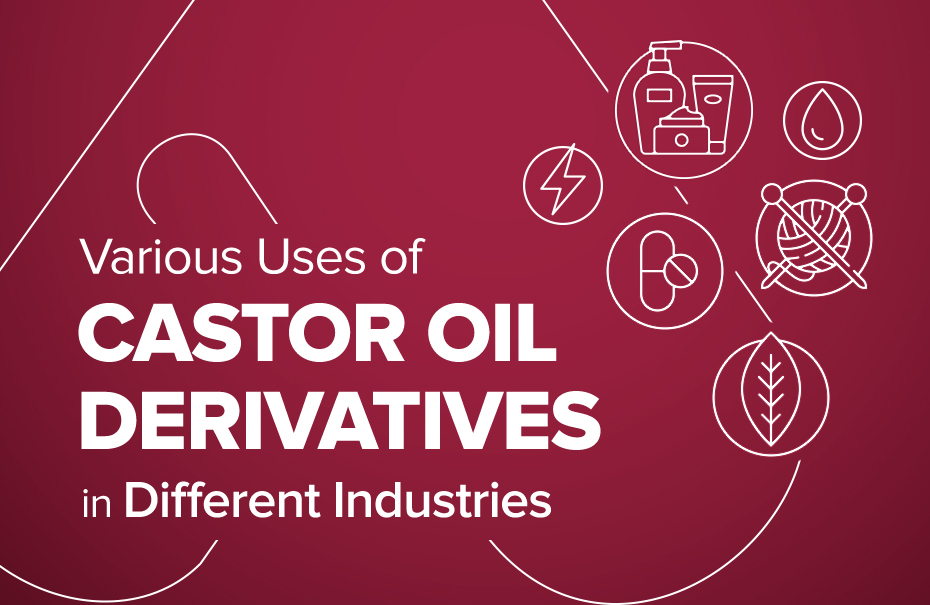Various Uses of Castor Oil Derivatives in Different Industries

Do you know that plant-based products can cause major changes in industries like the cosmetic industry, the pharmaceutical industry, and agriculture? One of the magical plant-based products is Castor Oil. Castor Oil, extracted from the castor bean plant, stands out for its rich composition, and distinct purposes.
In addition, Castor Oil Derivatives show how plant-based products can meet the requirements of various industries ranging from raw material needs to sustainability-related concerns. Castor Oil Derivatives are useful renewable reagents that are environmentally friendly. Different industries employ castor oil derivatives because of their varied uses.
In this blog, we will explore why castor oil derivatives are the preferred choice in different industries by understanding their versatile uses across industries.
What Are Castor Oil Derivatives?
Derivatives of castor oil are different kinds of products that are made from raw castor oil. These derivatives need to go through several chemical steps, including saponification, esterification, hydrolysis, and hydrogenation. They have certain qualities that make them appropriate for certain industrial uses. Because castor oil contains ricinoleic acid, they are flexible.
Several types of Castor Oil Derivatives available are:
- Cold-Pressed Castor Oil
- Hydrogenated Castor Oil
- Deodorised Castor Oil
- Jamaican Black Castor Oil
- Dehydrated Castor Oil
To understand these Castor Oil Derivatives in more detail and explore their manufacturing processes, and properties, click here.
Applications of Castor Oil Derivatives in Different Industries
1 Personal Care and Cosmetics Industry
Demand for natural and sustainable ingredients has increased in the cosmetics and personal care industry. The growing consequences of their products on the environment, society, and economy is the main reason. Because of their uses and safety features, castor oil derivatives, a very versatile bio-based resource, have become widely used in various industries.
Derivatives of castor oil play a crucial role in cosmetics and personal hygiene items because of their excellent capacity to absorb moisture. For example:
- In lipsticks, castor oil derivatives, like castor wax, enhance the shine and provide a smooth feel. This eases the process of applying lipstick (in one glide) and makes them look more appealing.
- In soaps, body washes, and cleansers, derivatives act as natural conditioners and have better foaming properties.
- In skin creams, body oils, and lotions, derivatives help to maintain skin moisturization and hydration.
- When used in hair care products, they improve hair strength and make hair soft and shiny.
Also, castor oil derivatives are mild on the skin due to hypoallergenic properties which is ideal for sensitive skin. This increases the trust of consumers in the brands using castor oil.
2 Pharmaceutical Industry
Castor oil, in pharmaceuticals, works as an emulsifying and, solubilizing agent. Also, the technology in modern pharmaceutical processes demands castor oil. Castor oil derivatives such as hydrogenated castor oil are used in capsule coatings for the controlled release of drugs to the body and to increase the effectiveness of the drug.
Ricinoleic acid, which is a major constituent of castor oil, is also used as an active part of laxatives. The derivatives are also used in several ointments to ensure their proper absorption in the skin.
Cold-pressed Castor Oil is one of the castor oil derivatives used for medicinal purposes because of its nutrient retention ability.
3 Plastics and Polymers Sector
The Plastics and Polymers Sector is shifting towards greener products. And, Castor oil products play a key role in this transformation. The applications of derivatives in this sector involve:
- Sebacic acid, a derivative of castor oil, is used in the production of Nylon. It is used to manufacture Nylon 6,10 and make it more flexible and stronger.
- Castor oil products are also used in the production of biodegradable materials such as plastic-free packaging.
- Hydrogenated castor oil and deodorized castor oil are used for polyurethane coatings. These derivatives make coating surfaces hard and chemically stable. This helps in making the industry more sustainable.
4 Lubricants Industry
It is believed that vegetable oil is a good and biodegradable lubricant and is a priority over petroleum-based, castor oil-based, or other kinds of lubricants. However, due to its properties such as oxidative stability, vegetable oils do not have widespread use as lube.
If vegetable oil-based lubricants are compared with castor oil lubes, then castor oil lubricants will stand out. Because castor oil has the ability to bear high temperatures and has low-temperature viscosity properties.
Castor oil is highly suitable to be used as a lubricant in jets, and racing engines, and is also used in diesel. Also, lubricant companies use castor oil derivatives because of their emulsion stability, corrosion resistance, and lubricity.
5 Agriculture Industry
Very few people know that castor oil is used as an organic manure in the Agriculture Sector. This natural manure curbs the side effects of chemical fertilizers and improves soil fertility. On the other hand, diluted castor oil is used as a pesticide. Castor oil is a non-toxic oil extracted from ricinoleic acid, which has pest-repelling properties. It has a foul smell that helps keep animals and moles away and protects crops and trees without harming animals.
5 Food and Beverages Sector
The Food and Beverages Industry uses polyoxeyethylated castor oil (PEO-CO) derivative. This is used to enhance flavors in candy, chocolates, and food additives. (Source) The industry also uses cremophor or polyoxyl castor oil in packaging food products. In Indian households, people use castor oil derivatives to preserve rice, wheat, pulses, and other grains by coating the grains with edible castor oil.
6 Renewable Energy Sector
Do you know that castor oil has physiochemical properties because it has the hydroxyl fatty acid structure and chemical composition of oil? These properties make castor oil an important material in renewable energy sources.
Also, exhausting fossil fuels has increased the need to incorporate renewable fuels or sources in the renewable energy sector. This is why, biodiesel fuels are leading the way. And, castor oil serves as a material to produce biodiesel. Furthermore, castor oil derivatives are used for coating solar panels which increases their efficiency and total lifespan.
7 Textile Industry
Did you know about a fabric made from oil? Well, Castor Fiber is made of castor oil and is its key derivative. The double bonds, hydroxyl groups, and ester linkages in castor oil prepared many derivatives including Castor Fiber.
Castor Fibre has all synthetic fabric properties but is sustainable, eco-friendly, and biodegradable. This fabric is widely used in the textile industry because of its following nature:
- Quick-drying
- Ultralight
- Highly Breathable
- Super Stretchable
- Comfortable
- Non-iron (Wrinkle-free)
- Temperature regulation in all Climates
- Odor-neutralizing
- More Choice of Colours
Also Read, “Contribution of Castor Oil to Textile Industry” for a detailed understanding.
8 Paints and Coatings Industry
The market of Paint, Supplies & Wallpaper in India is projected to experience an annual growth of 1.78% from 2025 to 2029. The diverse geographical and cultural preferences of the country impact this market. Changing preferences towards sustainability have increased the demand for natural and eco-friendly paint options. The negative impacts of using lead-based paints on the environment have boosted this demand more.
Hence, plant-based paints made with natural castor oil came in preference. These paints are less toxic and are generally less priced. Castor oil paints are easily available across the world and have an environment-friendly nature and biodegradability factor.
Some Castor Oil Derivatives used in the Paints and Coatings Industry are:
- Blown Castor Oil, or oxidized oil, is a derivative with high viscosity. It is used as a lubricant in lithographic inks and a major element in hydraulic fluids.
- Deodorized Castor Oil is a binder for paints, sealants, enamels, and more. It is used for obtaining fast dry coatings and is required in sanitary linings.
- Refined Castor Oil is an insoluble polymer used as a lubricant in petroleum emulsification, brake fluid, hydraulic fluid, paints, etc.
Conclusion
Thus, Castor oil derivatives have several uses and are gaining recognition as an effective renewable resource. They develop a range of personal care products and improve industrial processes. Castor oil derivatives have the potential to foster the development of a sustainable future.
At Ambuja Solvex, we welcome you to discover the immense potential of castor oil derivatives and understand their benefits for your industry. We have advanced manufacturing facilities and proper quality standards as well.
Need Help in Discovering the Suitable Castor Oil Derivative for Your Industry?
Contact us now!



